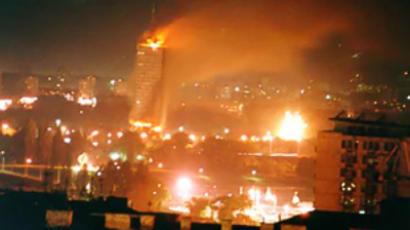UK extradition failure may put US base in jeopardy
The Kyrgyz government is putting pressure on London via the US. If Washington wants to keep its transit air base, it should ask its British friends to extradite the ousted Kyrgyz president’s son, an official said.
The move is sponsored by Azimbek Meknazarov, deputy chair in Kyrgyzstan’s temporary government, who is responsible judiciary issues and prosecution, AKIpress news agency reports.
The American Manas transit base in Kyrgyzstan is used by NATO to supply its Afghanistan operation. The previous government of the country had threatened to shut down the base, but the Pentagon offered higher rent, and it was kept operational. Apparently, the new government believes that the US will find it valuable enough to support the Kyrgyz arrest warrant for Maksim Bakiyev, who is reportedly in Britain.
The younger Bakiyev, who is suspected of mass fraud and corruption in his home country during his father Kurmanbek Bakiyev’s presidential terms, is on the international wanted list.
Meanwhile Maksim Bakiyev, son of the former Kyrgyz president, has applied for political asylum in Great Britain, informs The Times of London.
Earlier it was announced that Bakiyev junior was detained in London’s Farnborough airport after arriving there on a private jet without valid documents.
As reported earlier, the prosecutor general of Kyrgyzstan is preparing documents requesting Maksim Bakiyev’s extradition to Bishkek, where he is accused of being involved in corruption schemes.
Pierre-Emmanuel Ducruet of the International Committee of the Red Cross told RT about the main needs and dangers for the refugees.
“According to our estimates, around 80,000 to 100,000 people crossed the border to Uzbekistan these last days,” Ducruet said. “The situation there is very frightening because people are in need of everything, food, water… Some people are willing to go back to Kyrgyzstan, while others are willing to stay back in Uzbekistan. The biggest risk now is the risk of dysentery and diarrhea, and that’s the reason why we are providing displaced people and refugees with drinkable water. If the situation remains the same or does not change drastically, then we’ll still be here for a long time.”













